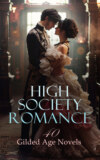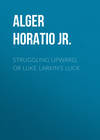Kitabı oku: «Risen from the Ranks; Or, Harry Walton's Success», sayfa 8
CHAPTER XXII
MISS DEBORAH'S EYES ARE OPENED
Aunt Deborah felt that she had done a good stroke of business. She had lent Ferdinand four hundred and fifty dollars, and received in return a note for five hundred and fifty, secured by a diamond ring worth even more. She plumed herself on her shrewdness, though at times she felt a little twinge at the idea of the exorbitant interest which she had exacted from so near a relative.
"But he said the money was worth that to him," she said to herself in extenuation, "and he's goin' to get two thousand dollars a year. I didn't want to lend the money, I'd rather have had it in the savings bank, but I did it to obleege him."
By such casuistry Aunt Deborah quieted her conscience, and carefully put the ring away among her bonds and mortgages.
"Who'd think a little ring like that should be worth so much?" she said to herself. "It's clear waste of money. But then Ferdinand didn't buy it. It was give to him, and a very foolish gift it was too. Railly, it makes me nervous to have it to take care of. It's so little it might get lost easy."
Aunt Deborah plumed herself upon her shrewdness. It was not easy to get the advantage of her in a bargain, and yet she had accepted the ring as security for a considerable loan without once questioning its genuineness. She relied implicitly upon her nephew's assurance of its genuineness, just as she had relied upon his assertion of relationship. But the time was soon coming when she was to be undeceived.
One day, a neighbor stopped his horse in front of her house, and jumping out of his wagon, walked up to the door and knocked.
"Good-morning, Mr. Simpson," said the old lady, answering the knock herself; "won't you come in?"
"Thank you, Miss Deborah, I can't stop this morning. I was at the post-office just now, when I saw there was a letter for you, and thought I'd bring it along."
"A letter for me!" said Aunt Deborah in some surprise, for her correspondence was very limited. "Who's it from?"
"It is post-marked New York," said Mr. Simpson.
"I don't know no one in New York," said the old lady, fumbling in her pockets for her spectacles.
"Maybe it's one of your old beaux," said Mr. Simpson, humorously, a joke which brought a grim smile to the face of the old spinster. "But I must be goin'. If it's an offer of marriage, don't forget to invite me to the wedding."
Aunt Deborah went into the house, and seating herself in her accustomed place, carefully opened the letter. She turned over the page, and glanced at the signature. To her astonishment it was signed,
"Your affectionate nephew,
"FERDINAND B. KENSINGTON."
"Ferdinand!" she exclaimed in surprise. "Why, I thought he was in Californy by this time. How could he write from New York? I s'pose he'll explain. I hope he didn't lose the money I lent him."
The first sentence in the letter was destined to surprise Miss Deborah yet more.
"Dear aunt," it commenced, "it is so many years since we have met, that I am afraid you have forgotten me."
"So many years!" repeated Miss Deborah in bewilderment. "What on earth can Ferdinand mean? Why, it's only five weeks yesterday since he was here. He must be crazy."
She resumed reading.
"I have often had it in mind to make you a little visit, but I have been so engrossed by business that I have been unable to get away. I am a salesman for A. T. Stewart, whom you must have heard of, as he is the largest retail dealer in the city. I have been three years in his employ, and have been promoted by degrees, till I now receive quite a good salary, until—and that is the news I have to write you—I have felt justifed in getting married. My wedding is fixed for next week, Thursday. I should be very glad if you could attend, though I suppose you would consider it a long journey. But at any rate I can assure you that I should be delighted to see you present on the occasion, and so would Maria. If you can't come, write to me, at any rate, in memory of old times. It is just possible that during our bridal tour—we are to go to the White Mountains for a week—we shall call on you. Let me know if it will be convenient for you to receive us for a day.
"Your affectionate nephew,
"FERDINAND B. KENSINGTON."
Miss Deborah read this letter like one dazed. She had to read it a second time before she could comprehend its purport.
"Ferdinand going to be married! He never said a word about it when he was here. And he don't say a word about Californy. Then again he says he hasn't seen me for years. Merciful man! I see it now—the other fellow was an impostor!" exclaimed Miss Deborah, jumping, to her feet in excitement. "What did he want to deceive an old woman for?"
It flashed upon her at once. He came after money, and he had succeeded only too well. He had carried away four hundred and fifty dollars with him. True, he had left a note, and security. But another terrible suspicion had entered the old lady's mind; the ring might not be genuine.
"I must know at once," exclaimed the disturbed spinster. "I'll go over to Brandon, to the jeweller's, and inquire. If it's paste, then, Deborah Kensington, you're the biggest fool in Centreville."
Miss Deborah summoned Abner, her farm servant from the field, and ordered him instantly to harness the horse, as she wanted to go to Brandon.
"Do you want me to go with you?" asked Abner.
"To be sure, I can't drive so fur, and take care of the horse."
"It'll interrupt the work," objected Abner.
"Never mind about the work," said Deborah, impatiently. "I must go right off. It's on very important business."
"Wouldn't it be best to go after dinner?"
"No, we'll get some dinner over there, at the tavern."
"What's got into the old woman?" thought Abner. "It isn't like her to spend money at a tavern for dinner, when she might as well dine at home. Interruptin' the work, too! However, it's her business!"
Deborah was ready and waiting when the horse drove up the door. She got in, and they set out. Abner tried to open a conversation, but he found Miss Deborah strangely unsocial. She appeared to take no interest in the details of farm work of which he spoke.
"Something's on her mind, I guess," thought Abner; and, as we know, he was right.
In her hand Deborah clutched the ring, of whose genuineness she had come to entertain such painful doubts. It might be genuine, she tried to hope, even if it came from an impostor; but her hope was small. She felt a presentiment that it would prove as false as the man from whom she received it. As for the story of the manner in which he became possessed of it, doubtless that was as false as the rest.
"How blind I was!" groaned Deborah in secret. "I saw he didn't look like the family. What a goose I was to believe that story about his changin' the color of his hair! I was an old fool, and that's all about it."
"Drive to the jeweller's," said Miss Deborah, when they reached Brandon.
In some surprise, Abner complied.
Deborah got out of the wagon hastily and entered the store.
"What can I do for you, Miss Kensington?" asked the jeweller, who recognized the old lady.
"I want to show you a ring," said Aunt Deborah, abruptly. "Tell me what it's worth."
She produced the ring which the false Ferdinand had intrusted to her.
The jeweller scanned it closely.
"It's a good imitation of a diamond ring," he said.
"Imitation!" gasped Deborah.
"Yes; you didn't think it was genuine?"
"What's it worth?"
"The value of the gold. That appears to be genuine. It may be worth three dollars."
"Three dollars!" ejaculated Deborah. "He told me it cost six hundred and fifty."
"Whoever told you that was trying to deceive you."
"You're sure about its being imitation, are you?"
"There can be no doubt about it."
"That's what I thought," muttered the old lady, her face pale and rigid. "Is there anything to pay?"
"Oh, no; I am glad to be of service to you."
"Good-afternoon, then," said Deborah, abruptly, and she left the store.
"Drive home, Abner, as quick as you can," she said.
"I haven't had any dinner," Abner remarked, "You said you'd get some at the tavern."
"Did I? Well, drive over there. I'm not hungry myself, but I'll pay for some dinner for you."
Poor Aunt Deborah! it was not the loss alone that troubled her, though she was fond of money; but it was humiliating to think that she had fallen such an easy prey to a designing adventurer. In her present bitter mood, she would gladly have ridden fifty miles to see the false Ferdinand hanged.
CHAPTER XXIII
THE PLOT AGAINST FLETCHER
The intimacy between Harry and Oscar Vincent continued, and, as during the former term, the latter volunteered to continue giving French lessons to our hero. These were now partly of a conversational character, and, as Harry was thoroughly in earnest, it was not long before he was able to speak quite creditably.
About the first of November, Fitzgerald Fletcher left the Prescott Academy, and returned to his home in Boston. It was not because he had finished his education, but because he felt that he was not appreciated by his fellow-students. He had been ambitious to be elected to an official position in the Clionian Society, but his aspirations were not gratified. He might have accepted this disappointment, and borne it as well as he could, had it not been aggravated by the elevation of Harry Walton to the presidency. To be only a common member, while a boy so far his social inferior was President, was more than Fitzgerald could stand. He was so incensed that upon the announcement of the vote he immediately rose to a point of order.
"Mr. President," he said warmly, "I must protest against this election. Walton is not a member of the Prescott Academy, and it is unconstitutional to elect him President."
"Will the gentleman point out the constitutional clause which has been violated by Walton's election?" said Oscar Vincent.
"Mr. President," said Fletcher, "this Society was founded by students of the Prescott Academy; and the offices should be confined to the members of the school."
Harry Walton rose and said: "Mr. President, my election has been a great surprise to myself. I had no idea that any one had thought of me for the position. I feel highly complimented by your kindness, and deeply grateful for it; but there is something in what Mr. Fletcher says. You have kindly allowed me to share in the benefits of the Society, and that satisfies me. I think it will be well for you to make another choice as President."
"I will put it to vote," said the presiding officer. "Those who are ready to accept Mr. Walton's resignation will signify it in the usual way."
Fletcher raised his hand, but he was alone.
"Those who are opposed," said the President.
Every other hand except Harry's was now raised.
"Mr. Walton, your resignation is not accepted," said the presiding officer. "I call upon you to assume the duties of your new position."
Harry rose, and, modestly advanced to the chair. "I have already thanked you, gentlemen," he said, "for the honor you have conferred upon me in selecting me as your presiding officer. I have only to add that I will discharge its duties to the best of my ability."
All applauded except Fletcher. He sat with an unpleasant scowl upon his face, and waited for the result of the balloting for Vice-President and Secretary. Had he been elected to either position, the Clionian would probably have retained his illustrious name upon its roll. But as these honors were conferred upon other members, he formed the heroic resolution no longer to remain a member.
"Mr. President," he said, when the last vote was announced, "I desire to terminate my connection with this Society."
"I hope Mr. Fletcher will reconsider his determination," said Harry from the chair.
"I would like to inquire the gentleman's reasons," said Tom Carver.
"I don't like the way in which the Society is managed," said Fletcher. "I predict that it will soon disband."
"I don't see any signs of it," said Oscar. "If the gentleman is really sincere, he should not desert the Clionian in the hour of danger."
"I insist upon my resignation," said Fletcher.
"I move that it be accepted," said Tom Carver.
"Second the motion," said the boy who sat next him.
The resignation was unanimously accepted. Fletcher ought to have felt gratified at the prompt granting of his request, but he was not. He had intended to strike dismay into the Society by his proposal to withdraw, but there was no consternation visible. Apparently they were willing to let him go.
He rose from his seat mortified and wrathful.
"Gentlemen," he said, "you have complied with my request, and I am deeply grateful. I no longer consider it an honor to belong to the Clionian. I trust your new President may succeed as well in his new office as he has in the capacity of a printer's devil."
Fletcher was unable to proceed, being interrupted by a storm of hisses, in the midst of which he hurriedly made his exit.
"He wanted to be President himself—that's what's the matter," said Tom Carver in a whisper to his neighbor. "But he couldn't blame us for not wanting to have him."
Other members of the Society came to the same conclusion, and it was generally said that Fletcher had done himself no good by his undignified resentment. His parting taunt levelled at Harry was regarded as mean and ungenerous, and only strengthened the sentiment in favor of our hero who bore his honors modestly. In fact Tom Carver, who was fond of fun, conceived a project for mortifying Fletcher, and readily obtained the co-operation of his classmates.
It must be premised that Fitz was vain of his reading and declamation. He had a secret suspicion that, if he should choose to devote his talents to the stage, he would make a second Booth. This self-conceit of his made it the more easy to play off the following joke upon him.
A fortnight later, the young ladies of the village proposed to hold a Fair to raise funds for some public object. At the head of the committee of arrangements was a sister of the doctor's wife, named Pauline Clinton. This will explain the following letter which, Fletcher received the succeeding day:—
"FITZGERALD FLETCHER, ESQ.—Dear Sir: Understanding that you are a superior reader, we should be glad of your assistance in lending eclat to the Fair which we propose to hold on the evening of the 29th. Will you be kind enough to occupy twenty minutes by reading such selections as in your opinion will be of popular interest? It is desirable that you should let me know as soon as possible what pieces you have selected, that they may be printed on the programme.
"Yours respectfully,
"PAULINE CLINTON,
"(for the Committee)."
This note reached Fletcher at a time when he was still smarting from his disappointment in obtaining promotion from the Clionian Society. He read it with a flushed and triumphant face. He never thought of questioning its genuineness. Was it not true that he was a superior reader? What more natural than that he should be invited to give eclat to the Fair by the exercise of his talents! He felt it to be a deserved compliment. It was a greater honor to be solicited to give a public reading than to be elected President of the Clionian Society.
"They won't laugh at me now," thought Fletcher.
He immediately started for Oscar's room to make known his new honors.
"How are you, Fitz?" said Oscar, who was in the secret, and guessed the errand on which he came.
"Very well, thank you, Oscar," answered Fletcher, in a stately manner.
"Anything new with you?" asked Oscar, carelessly.
"Not much," said Fletcher. "There's a note I just received.
"Whew!" exclaimed Oscar, in affected astonishment. "Are you going to accept?"
"I suppose I ought to oblige them," said Fletcher. "It won't be much trouble to me, you know."
"To be sure; it's in a good cause. But how did they hear of your reading?"
"Oh, there are no secrets in a small village like this," said Fletcher.
"It's certainly a great compliment. Has anybody else been invited to read?"
"I think not," said Fletcher, proudly. "They rely upon me."
"Couldn't you get a chance for me? It would be quite an honor, and I should like it for the sake of the family."
"I shouldn't feel at liberty to interfere with their arrangements," said Fletcher, who didn't wish to share the glory with any one. "Besides, you don't read well enough."
"Well, I suppose I must give it up," said Oscar, in a tone of resignation. "By the way, what have you decided to read?"
"I haven't quite made up my mind," said Fletcher, in a tone of importance. "I have only just received the invitation, you know."
"Haven't you answered it yet?"
"No; but I shall as soon as I go home. Good-night, Oscar."
"Good-night, Fitz."
"How mad Fitz will be when he finds he has been sold!" said Oscar to himself. "But he deserves it for treating Harry so meanly."
CHAPTER XXIV
READING UNDER DIFFICULTIES
On reaching home, Fletcher looked over his "Speaker," and selected three poems which he thought he could read with best effect. The selection made, he sat down to his desk, and wrote a reply to the invitation, as follows:—
"MISS PAULINE CLINTON: I hasten to acknowledge your polite invitation to occupy twenty minutes in reading choice selections at your approaching Fair. I have paid much attention to reading, and hope to be able to give pleasure to the large numbers who will doubtless honor the occasion with their presence. I have selected three poems,—Poe's Raven, the Battle of Ivry, by Macaulay, and Marco Bozarris, by Halleck. I shall be much pleased if my humble efforts add eclat to the occasion.
"Yours, very respectfully,
"FITZGERALD FLETCHER."
"There," said Fletcher, reading his letter through with satisfaction. "I think that will do. It is high-toned and dignified, and shows that I am highly cultured and refined. I will copy it off, and mail it."
Fletcher saw his letter deposited in the post-office, and returned to his room.
"I ought to practise reading these poems, so as to do it up handsomely," he said. "I suppose I shall get a good notice in the 'Gazette.' If I do, I will buy a dozen papers, and send to my friends. They will see that I am a person of consequence in Centreville, even if I didn't get elected to any office in the high and mighty Clionian Society."
I am sorry that I cannot reproduce the withering sarcasm which Fletcher put into his tone in the last sentence.
When Demosthenes was practising oratory, he sought the sea-shore; but Fitzgerald repaired instead to a piece of woods about half a mile distant. It was rather an unfortunate selection, as will appear.
It so happened that Tom Carver and Hiram Huntley were strolling about the woods, when they espied Fletcher approaching with an open book in his hand.
"Hiram," said Tom, "there's fun coming. There's Fitz Fletcher with his 'Speaker' in his hand. He's going to practise reading in the woods. Let us hide, and hear the fun."
"I'm in for it," said Hiram, "but where will be the best place to hide?"
"Here in this hollow tree. He'll be very apt to halt here."
"All right! Go ahead, I'll follow."
They quickly concealed themselves in the tree, unobserved by Fletcher, whose eyes were on his book.
About ten feet from the tree he paused.
"I guess this'll be a good place," he said aloud. "There's no one to disturb me here. Now, which shall I begin with? I think I'll try The Raven. But first it may be well to practise an appropriate little speech. Something like this:"—
Fletcher made a low bow to the assembled trees, cleared his throat, and commenced,—
"Ladies and Gentlemen: It gives me great pleasure to appear before you this evening, in compliance with the request of the committee, who have thought that my humble efforts would give eclat to the fair. I am not a professional reader, but I have ever found pleasure in reciting the noble productions of our best authors, and I hope to give you pleasure."
"That'll do, I think," said Fletcher, complacently. "Now I'll try The Raven."
In a deep, sepulchral tone, Fletcher read the first verse, which is quoted below:—
"Once upon a midnight dreary, while I pondered weak and weary,
Over many a quaint and curious volume of forgotten lore,
While I nodded, nearly napping, suddenly there came a tapping,
As of some one gently rapping, rapping at my chamber door.
''Tis some visitor,' I muttered, 'tapping at my chamber door—
Only this and nothing more.'"
Was it fancy, or did Fletcher really hear a slow, measured tapping near him—upon one of the trees, as it seemed? He started, and looked nervously; but the noise stopped, and he decided that he had been deceived, since no one was visible.
The boys within the tree made no other demonstration till Fletcher had read the following verse:—
"Back into the chamber turning, all my soul within me burning,
Soon again I heard a tapping, something louder than before.
'Surely,' said I, 'surely that is something at my window lattice;
Let me see then what thereat is, and this mystery explore—
Let my heart be still a moment, and this mystery explore;
'Tis the wind, and nothing more.'"
Here an indescribable, unearthly noise was heard from the interior of the tree, like the wailing of some discontented ghost.
"Good heavens! what's that?" ejaculated Fletcher, turning pale, and looking nervously around him.
It was growing late, and the branches above him, partially stripped of their leaves, rustled in the wind. Fletcher was somewhat nervous, and the weird character of the poem probably increased this feeling, and made him very uncomfortable. He summoned up courage enough, however, to go on, though his voice shook a little. He was permitted to go on without interruption to the end. Those who are familiar with the poem, know that it becomes more and more wild and weird as it draws to the conclusion. This, with his gloomy surroundings, had its effect upon the mind of Fletcher. Scarcely had he uttered the last words, when a burst of wild and sepulchral laughter was heard within a few feet of him. A cry of fear proceeded from Fletcher, and, clutching his book, he ran at wild speed from the enchanted spot, not daring to look behind him. Indeed, he never stopped running till he passed out of the shadow of the woods, and was well on his way homeward.
Tom Carver and Hiram crept out from their place of concealment. They threw themselves on the ground, and roared with laughter.
"I never had such fun in my life," said Tom.
"Nor I."
"I wonder what Fitz thought."
"That the wood was enchanted, probably; he left in a hurry."
"Yes; he stood not on the order of his going, but went at once."
"I wish I could have seen him. We must have made a fearful noise."
"I was almost frightened myself. He must be almost home by this time."
"When do you think he'll find out about the trick?"
"About the invitation? Not till he gets a letter from Miss Clinton, telling him it is all a mistake. He will be terribly mortified."
Meanwhile Fletcher reached home, tired and out of breath. His temporary fear was over, but he was quite at sea as to the cause of the noises he had heard. He could not suspect any of his school-fellows, for no one was visible, nor had he any idea that any were in the wood at the time.
"I wonder if it was an animal," he reflected. "It was a fearful noise. I must find some other place to practise reading in. I wouldn't go to that wood again for fifty dollars."
But Fletcher's readings were not destined to be long continued. When he got home from school the next day, he found the following note, which had been left for him during the forenoon:—
"MR. FITZGERALD FLETCHER,—Dear Sir: I beg to thank you for your kind proposal to read at our Fair; but I think there must be some mistake in the matter, as we have never contemplated having any readings, nor have I written to you on the subject, as you intimate. I fear that we shall not have time to spare for such a feature, though, under other circumstances, it might be attractive. In behalf of the committee, I beg to tender thanks for your kind proposal.
"Yours respectfully,
"PAULINE CLINTON."
Fletcher read this letter with feelings which can better be imagined than described. He had already written home in the most boastful manner about the invitation he had received, and he knew that before he could contradict it, it would have been generally reported by his gratified parents to his city friends. And now he would be compelled to explain that he had been duped, besides enduring the jeers of those who had planned the trick.
This was more than he could endure. He formed a sudden resolution. He would feign illness, and go home the next day. He could let it be inferred that it was sickness alone which had compelled him to give up the idea of appearing as a public reader.
Fitz immediately acted upon his decision, and the next day found him on the way to Boston. He never returned to the Prescott Academy as a student.










